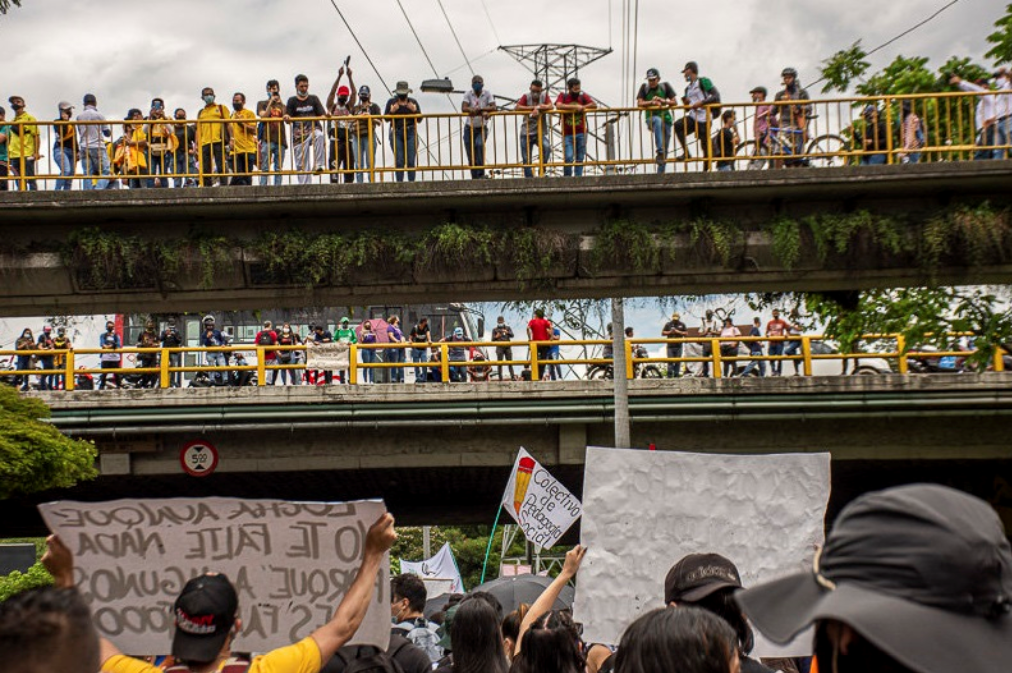Military personnel on the streets and the colombian government violating protestors rights
A wave of protests against tax reform is marked by violent repression
 Colombian cities taken over by protestors. Photo: Rubén Torres/Colombia Informa
Colombian cities taken over by protestors. Photo: Rubén Torres/Colombia Informa
Conectas repudiates violence against protestors in Colombia and is calling for the right to protest to be respected. Since the end of April, at least 31 people have died in the protests that have taken over the streets of Colombia, according to Defensoria del Pueblo and social organisations. However, this figure is not certain given the difficulty of obtaining official records.
The protests against a tax reform bill issued by the government are being repressed by public security agents and military personnel, who are using firearms and other methods against the protestors.
The protestors on the streets are also denouncing the economic inequality caused by management of the pandemic and the murders of indigenous leaders in several different regions. On the fifth day of the protests, in response to the mobilisation, the country´s president, Iván Duque, who has been in office since 2018, withdrew the reform from the Congress agenda, but thousands of people are still on the streets of Colombia´s principal cities.
Read more
According to Maryuri Grisales, Advisor on the Strengthening Democratic Space programme at Conectas, the government is providing no guarantees to the people on the streets and the right to protest is not being respected. Grisales, who is in Cali, one of the epicentres of the protests, said that hundreds of people have been arbitrarily arrested and numerous disappearances have been recorded in the last seven days, in a number of cities throughout the country.
Because of the difficulty in obtaining official figures, civil society organisations are coming together to gather information about condemnations, directly from social media. The NGO, Temblores, for example, has counted 1,181 denouncements of police abuse.

The protests in context
The protests started last Wednesday 28th, when the Comité Nacional del Paro (National Centre for Strikes), trade union headquarters and social movements called for a general strike against the tax reform that, according to these organisations, will aggravate social inequality in the scenario of the pandemic.
Attempts at economic reform have been facing popular resistance since 2019. One of the most contested proposals is the creation of a 19% tax on public services which would hit the poorest people hardest.
For the time being, the protestors, made up of social movements, organisations of indigenous people, students and recently lorry drivers, have managed to overturn the Duque bill. The Finance Minister, Alberto Carrasquilla, who is behind the proposals, resigned on Monday 3rd.
Economic inequality, the basis for the protests, has been made worse by Covid 19. The extreme poverty rate rose 5.5% in the pandemic, according to official data. People are also demanding an explanation for the deaths of indigenous leaders executed by armed groups connected to drug trafficking. Since 2016, over 190 indigenous people have been murdered and the pandemic has made the situation worse as many indigenous groups are socially isolating.
Human Rights Organisations
A number of organisations have spoken out in the face of the escalating violence in Colombia. In a note the Organização Nacional Indígena da Colômbia stated that “they deny, reject and condemn the decision by Iván Duque´s government, the Minister for Defence, Diego Molano and the armed forces, under the command of Eduardo Zapateiro, to massacre the Colombian people they had vowed to defend and who are protesting legitimately against bad, corrupt and nepostic governance and against reforms that worsen hunger, poverty and war.”
The NGO Dejustiça has condemned the “serious human rights violations” by the government and points to their failure to fulfil constitutional norms and international treaties that guarantee the right the protest freely.
In an interview on Tuesday, 4th, Marta Hurtado, spokesperson for the UN High Commissioner for Human Rights stated that they are “deeply alarmed about what is happening in the city of Cali, in Colombia where the police opened fire on protesters who were opposing the tax reform, killing and injuring a number of people, according to the information available.”
The InterAmerican Human Rights Commission, also stressed that “the participation of the armed forces in security activities should be exceptional, contingent, complementary, regulated and overseen” and states must respect the right to protest.
“We add our names to the condemnations against the abuse of power by the Colombian government, the undue use of force, the criminalisation of protests and the militarisation of the cities, as well as the demand that human rights violations by public authorities are investigated.” Said Grisales.






